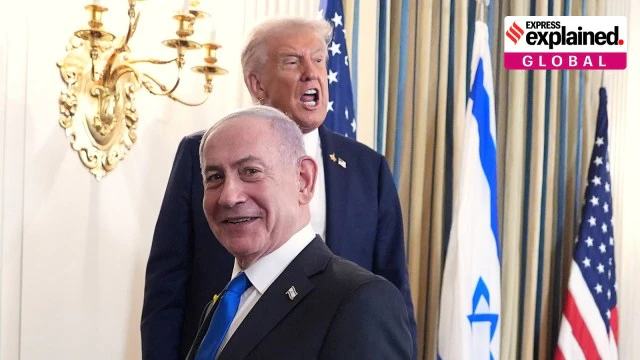A Golden Cage or a Gateway to Peace? India Navigates the Perilous Promise of Trump’s Gaza Deal

Image via The Indian Express
NEW DELHI – The Middle East has long been the graveyard of peace plans. The road to a lasting settlement between Israelis and Palestinians is littered with the ghosts of failed initiatives and broken promises—from the hopeful handshakes of the Oslo Accords to the bitter collapses of countless summits. Into this historical minefield now steps US President Donald Trump, not with the cautious language of a diplomat, but with the audacious blueprint of a corporate turnaround artist.
His “Gaza Prosperity and Security Initiative” is a radical departure from the past. It does not speak of historical rights or political philosophy; it speaks the language of investment, leverage, and a clear-cut transactional deal. It is a shock-and-awe approach to peacemaking, designed to overwhelm decades of animosity with a tidal wave of capital.
For India, a nation whose fortunes are inextricably linked to the stability of this volatile region, this plan is the most significant geopolitical development of the year. It presents both a tantalizing gateway to a more secure future and the perilous risk of a gilded cage that traps the region in a new form of conflict. New Delhi’s response, therefore, has been a masterclass in diplomatic navigation—a delicate dance between expressing relief at the opportunity and maintaining caution about the inherent dangers.
The CEO’s Blueprint: Deconstructing the Trump Doctrine
To understand the Gaza plan is to understand the Trumpian worldview. It is a distillation of the dealmaker’s doctrine, applied to one of the world’s most intractable conflicts.
The plan is, first and foremost, a grand transaction. The offer on the table is clear: in exchange for the complete and verifiable disarmament of Hamas and all other militant groups, the world, led by the US and its Gulf Arab allies, will pour unprecedented billions into transforming Gaza. The proposal envisions a new “Marshall Plan” that would build a gleaming, modern society from the rubble, complete with a deep-sea port, high-tech industrial parks, and world-class infrastructure.
This is the ultimate leverage play. It seeks to make the economic benefits of peace so overwhelmingly attractive that the ideological appeal of armed struggle withers away. The plan also strategically reconfigures the players, sidelining traditional mediators and elevating a “board of directors” comprising Israel and the major Arab powers of the Abraham Accords. It is a top-down, results-oriented project that reflects the impatience of a businessman with the slow, circular processes of traditional diplomacy.
Reasons for Relief: Unlocking India’s Strategic Dreams
For New Delhi, the sheer ambition of the plan provides several profound reasons for relief. The primary and most overwhelming reason is the prospect of stability. A peaceful Middle East is not a luxury for India; it is a necessity.
- The IMEC Lifeline: The visionary India-Middle East-Europe Economic Corridor (IMEC), seen as India’s strategic answer to China’s Belt and Road Initiative, is currently a dream held hostage by regional conflict. A stable Gaza and a more integrated Israel-Arab world are the absolute prerequisites to turn this dream into a trillion-dollar reality. Trump’s plan, if it succeeds, would be the key that unlocks this transformative trade route.
- Energy and Diaspora Security: India’s economy runs on oil and gas from the Gulf. The safety of the nine million strong Indian diaspora in the region is a matter of paramount national concern. The current cycle of violence places both of these critical interests under constant threat. Any plan that credibly promises to end the conflict is, therefore, a massive strategic win.
- A Shared Stance on Terror: The plan’s hard-line, non-negotiable demand for the dismantling of terror groups strongly resonates with India’s core security principles. It provides New Delhi with a powerful new talking point on the global stage, reinforcing the message that there can be no compromise with terrorism.
Reasons for Caution: Navigating the Perilous Fine Print
Alongside this relief, however, is a deep-seated caution, born from a nuanced understanding of the region’s complexities.
- The Peril of a Political Vacuum: The plan’s most glaring vulnerability is its focus on economics to the near-total exclusion of the core political question of Palestinian statehood. For decades, India was a leading voice for a two-state solution. While its policy has pivoted towards pragmatism, New Delhi understands that the conflict is fundamentally about dignity, sovereignty, and national identity—aspirations that cannot be bought off. An economic boom without a political horizon risks creating a “golden cage,” where prosperity masks a simmering resentment that is bound to explode.
- The Iranian Powder Keg: The plan is designed to consolidate an anti-Iran alliance. While this aligns with some of India’s interests, it also threatens to pour fuel on the regional cold war between the Saudi-led bloc and Iran. India has painstakingly maintained good relations with both sides. A plan that forces countries to choose sides puts India’s delicate diplomatic balancing act under immense strain.
- The Fragility of the Deal: A peace built on the personal chemistry of a few powerful leaders is inherently less stable than one built on broad consensus. The plan’s success hinges on the continued commitment of these specific leaders, making it vulnerable to domestic political changes in any of the key countries.
India’s response, characterized by Prime Minister Modi’s praise for the plan’s goals, is a reflection of this dual reality. It is an act of strategic encouragement, not blind allegiance. It is an attempt to walk the finest of diplomatic tightropes—embracing the promise of a gateway to peace, while keeping a safe distance from the bars of a potential golden cage.